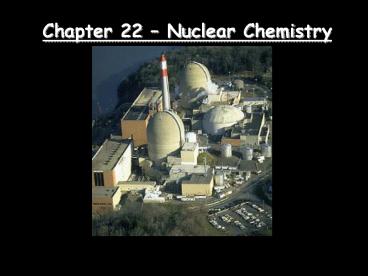Chapter 22 - PowerPoint PPT Presentation
Title:
Chapter 22
Description:
Chapter 22 Nuclear Chemistry Nuclear Symbols Types of Radioactive Decay alpha production (a): helium nucleus beta production (b): Alpha Radiation Beta Radiation ... – PowerPoint PPT presentation
Number of Views:60
Avg rating:3.0/5.0
Title: Chapter 22
1
Chapter 22 Nuclear Chemistry
2
Nuclear Symbols
Mass number (p no)
Element symbol
Atomic number (number of p)
3
Types of Radioactive Decay
4
2
- alpha production (a) helium nucleus
- beta production (b)
He
2
0
e
-
1
4
Alpha Radiation
Limited to VERY large nucleii.
5
Beta Radiation
Converts a neutron into a proton.
6
Types of Radioactive Decay
- gamma ray production (g)
- positron production
- electron capture (inner-orbital electron is
captured by the nucleus)
0
e
1
7
Types of Radiation
8
Deflection of Decay Particles
attract
Opposite charges_________ each other.
repel
Like charges_________ each other.
9
NuclearStability
Decay will occur in such a way as to return a
nucleus to the band (line) of stability.
10
Half-life Concept
11
Sample Half-Lives
12
A Decay Series
A radioactive nucleus reaches a stable state by a
series of steps
13
Nuclear Fission and Fusion
- Fusion Combining two light nuclei to form a
heavier, more stable nucleus. - Fission Splitting a heavy nucleus into two
nuclei with smaller mass numbers.
14
Energy and Mass
- Nuclear changes occur with small but measurable
losses of mass. The lost mass is called the mass
defect, and is converted to energy according to
Einsteins equation - DE Dmc2
- Dm mass defect
- DE change in energy
- c speed of light
Because c2 is so large, even small amounts of
mass are converted to enormous amount of energy.
15
Fission
16
Fission Processes
A self-sustaining fission process is called a
chain reaction.
17
A Fission Reactor
18
Fusion































